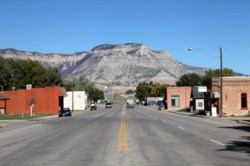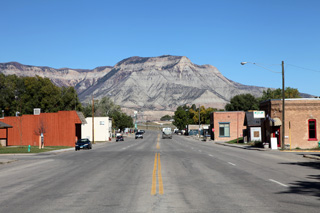
Garfield CountyOfficials in Parachute, Colo., stopped the flow of creek water into a reservoir following a natural-gas fluid spill.
Once again, Colorado’s fracking boom has residents wondering if there’s something in the water — carcinogenic benzene, in this case. A plant for fracked natural gas processor Williams Energy, near Parachute, Colo., spilled an estimated 241 barrels of mixed natural gas liquid into the ground, some of which eventually washed as benzene into Parachute Creek.
More than two months after the spill was discovered, neighbors of the plant are wondering why the energy company is being put in charge of the cleanup — and why the state has failed to issue any fines.
Benzene levels in Parachute Creek rose above a safe-to-drink 5 parts per billion following the spill, which was caused by a faulty pressure gauge on a four-inch pipeline.
The safety limit for benzene in Coloradoan drinking water sources is 5 parts per billion. But the state doesn’t define the creek as a source of drinking water, and the limit for such water bodies is 5,300 parts per billion. Less than two miles downstream from the Williams Energy plant, headgates that control the flow of water from Parachute Creek into an irrigation reservoir have been closed since the spill was discovered.
From the Glenwood Springs Post Independent:
“I’d like to say they’ve cleaned it up,” said [downstream rancher Sidney] Lindauer on Wednesday, referring to the combined efforts of Williams Midstream and the Colorado Department of Public Health and Environment (CDPHE).
But he said he is skeptical about the wisdom of leaving the cleanup in the hands of the company that owns the facilities from which the liquids leaked.
“We need an independent agency that isn’t associated with the industry, or any industry, to monitor that creek,” he said on Wednesday, lamenting that “they [the CDPHE] pretty much leave it up to Williams.”
He said he has seen unexplained layers of dingy, brownish foam on the creek’s surface in recent weeks, something he has occasionally seen in the past but in masses that were less dense than those he has spotted recently.
“Sometimes that creek is cloudy and off color, so you know something’s going on,” he concluded, explaining that he gets water for his horses and his pastures from the creek, though his domestic drinking water is from the Town of Parachute’s water system.
Following the spill, Colorado lawmakers were shocked to discover that state penalties for such accidents had been capped at $10,000 for the last half century. So they passed legislation [PDF], which was signed by the governor [PDF] earlier this month, that increases possible state fines for such incidents. But that all matters little so far: The state has yet to fine Williams Energy a penny.
From a May 16 article in the Denver Business Journal:
The Colorado Department of Public Health and Environment is launching into negotiations with Williams Cos. Inc. (NYSE: WMB) and subsidiary Bargath LLC for a “consent order” outlining the cleanup of an estimated 241 barrels of natural gas liquids that spilled near Parachute Creek in western Colorado. …
There are no plans at this time for that consent order, expected to be signed within a month, to include fines and penalties on the companies, Chris Urbina, executive director of the CDPHE, said Thursday.
However, he said, fines could be levied if Williams or Bargath, Williams’ pipeline subsidiary, fails to follow the department’s consent order for the cleanup.
Also, Urbina said, “We’re considering other fines and penalties associated with this spill. We take this very seriously.”
Why no fines? That’s one of the many questions neighbors have been asking. The answer is in the Business Times story:
The consent order won’t have a fine associated with it “as the release was not due to negligence but to accidental equipment failure,” the department said.
An accident, you say? Oh, well in that case. So sorry to have disturbed you, fracking company. Carry on.




